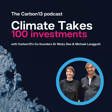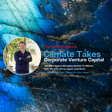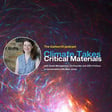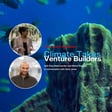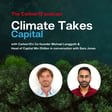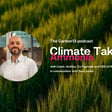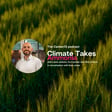Introduction to Climate Takes and Synthetic Biology
00:00:13
Speaker
Welcome to Carbon 13's podcast, Climate Takes. On this episode, it's all about synthetic biology. I'm delighted to be joined by Manu and Tim of Deep Blue Biotech ah for the podcast.
00:00:26
Speaker
And we are going to be looking at their takes on synthetic biology, the industries which use synthetic biology and those that will, um and what it will take ah to use these innovations to fight the climate emergency.
The Potential of Synthetic Biology and Bioeconomy
00:00:45
Speaker
We're coming at the crossroads of a major revolution that is going to change almost everything we know. If you take the bioeconomy as a whole, it's like a trillion industry. Like, what I think it was like 6.5 trillion because there is pharma,
00:01:01
Speaker
There is fuel, there is mining, there fashion, there is personal care, there is food.
00:01:16
Speaker
startups who you spread our risk, hopefully one them comes off, than have five in-house projects that cost us a fortune that might not work.
Deep Blue Biotech's Mission and Innovations
00:01:26
Speaker
We do this not because it's easy, but because we thought it would be easy.
00:01:35
Speaker
Welcome guys, thank you for joining me. Thank you for having me I think first off, what does Deep Blue Biotech do ah and what are you producing?
00:01:47
Speaker
Manu, do you want to take that one? but Yeah, but we are a synthetic biology startup. ah We are using cyanobacteria specifically, and which is a blue-green algae that we engineer in order to make green chemicals or alternatives to the existing chemicals that we have today.
00:02:07
Speaker
We have started with hyaluronic acid as our beachhead product, but we are looking at a wider the wider chemical industry to address that. So we use that, we use synthetic biology and computational models in order to accelerate the discovery process.
00:02:21
Speaker
And what we envision is a world that we can actually you know recreate the building blocks of the economy in a much more sustainable
Market Focus: Hyaluronic Acid and Butanol
00:02:29
Speaker
way. That's just as a reminder, because I just went through cyanobacteria, it's an algae, therefore,
00:02:34
Speaker
what we are using to create those chemicals is CO2. We're just taking CO2 and transforming that CO2 into useful materials. And we're going to dive into your beachhead, because basically you're a chemicals company, right? We're going to dive into your beachhead and why you're attacking that first.
00:02:51
Speaker
um But i also know that you are trying to scale up to butanol, ah which would be a holy grail of producing that at scale and at cost. Could you just give me an idea of how big the markets are for both hyaluronic acid and what it's used for, and boot null as well.
00:03:09
Speaker
but it's ah Very good question, I would say. um The hyaluronic acid question is much more straightforward. It's a 15 billion market. The uses there are from, you goes from pharma, medical uses as injectables, as, you know, for joints and and very specific uses to more the cosmetic industry, some sorts of nutraceutical. So you have a very consolidated market.
00:03:32
Speaker
you Usually, in particular, the beauty industry, ingredients go through cycles. So hyaluronic acid is one of of the those ingredients that are always on trend or finding new ways to go into trend.
00:03:44
Speaker
Butanol is you know, we started there. And when we say we want to eventually go there, what we are actually saying is we want to be as cost effective as we can tackle very cheap chemicals.
00:03:58
Speaker
Butanol being one of those examples. Now, the market for butanol in itself is around 4 billion. It's not a massive market. Why? Because... is not used to you know replace fuels, for example, that could be potentially at a one of the end-up uses that we we we can find for that for that specific chemical.
00:04:17
Speaker
So when if if we actually manage to do that transition, that would be very interesting, but we need to be extremely cost-effective. There's a couple of orders of magnitude because between what we can do with aleronic acid and what happens with butanel. But eventually we want to create an operating system that can deliver on that.
00:04:36
Speaker
I don't know, Tim, if you want to also build on that. No, the only thing to add is there is a sizeable graveyard of synthetic biology companies who've gone straight at the commodity chemicals problem and and failed because it takes them years and years to get to the point where they're competitive.
00:04:56
Speaker
Eventually the investors get bored ah and pull the plug and the company fails and never gets anywhere. So we took the view, especially with money being a lot tighter now than it used to be, that we needed to show that we can make the company commercially viable as quickly as possible with generating profits.
00:05:14
Speaker
The best way to do that was to target the higher value um chemicals ingredients first.
00:05:21
Speaker
What's the difference in price between Butanol and hyaluronic acid. Butanol is about $2 a litre. And hyaluronic acid is north of $2,000 per kilogram.
00:05:37
Speaker
So that's two versus 2,000. So to to be to be competitive, you can do one much quicker than you can do the other. But you do the one, you improve the technology, and as the technology improves and scales, then you can start to work your way down the pyramid through the the lower value items. And there's a whole list of items that we can get our teeth into.
00:05:58
Speaker
Yeah, I'm bearing in mind also that we started the blue with this, you know, more long-term vision that we wanted to regenerate the planet. yeah Like thinking sustainability in general had gone to an end. Like it just stopping what we are doing won't be enough. We need to start sort of reverting the effects of what we have already done.
00:06:18
Speaker
So this technology fits into that. And at the same time, we are very conscious that we are not going to save this planet. Obviously, we are not going to save it in general, but specifically, we're not going to save it with hyaluronic acid.
00:06:30
Speaker
like he's not It's not going to happen like that. It's going to happen through a myriad of different chemicals that we want to to get into that
Understanding Synthetic Biology and Its Importance
00:06:36
Speaker
aspect. But yeah as you said at the beginning, there is a tension there between how long it will take to us to get to that price competitiveness.
00:06:46
Speaker
you And the longer it takes, regardless of what a venture-backed company needs to deliver to their own investors, is when... the you know people, consumers are going to be exposed to the benefits of the new technologies that are coming in.
00:07:03
Speaker
Or they were going to be in the lab, no one is seeing them, they're just going through iterations to iterations to reach that cost competitive cost cost competitiveness, or we can actually expose them to, hey, yeah we can actually deliver high functionality, cost effectiveness, and great products now.
00:07:22
Speaker
I think that the journey of selecting these industries is part of the cost. We are going to be competitive faster, but also get people to engage with these technologies. Now, it doesn't look like, okay, this is in the future. It's only in the pharma industry.
00:07:34
Speaker
It's something that happens in the everyday. I'm going to... dive deeper into that point in just a second. um What is synthetic biology? What about it is synthetic?
00:07:49
Speaker
um And what is it what is it replacing that therefore makes it better for the climate?
00:07:56
Speaker
ah the what yeah Synthetic biology in general as a field is we do genetic engineering of for organisms. So we alter somehow the biology of existing organisms to do things that we want them to do.
00:08:13
Speaker
and So you any organism, a bacteria, yeast, a cyanobacteria in our case, an algae, They use ah you know the food, the elements they get in order to transform that into useful elements for their own subsistence.
00:08:28
Speaker
ah In the case of algae or cyanobacteria, they use CO2 and sand. Other ones will use different sources of sugar. What synthetic biology allows us to do is to edit some of those elements. I'm just going very simplistic because they are the two non-super technical guys in this call. but um In order for us, we can edit that so we can change the way they, you know, manufacture things internally to manufacture something that is of interest to us.
00:08:57
Speaker
What we do is to change the metabolic pathways. If they get sugar to make a cake, we say, okay, let's get sugar to make, you know, a cookie yeah because we want cookies. At the end of the we're changing that metabolism in a way that that allows us to create something else.
00:09:14
Speaker
The why we need other models and why we use computational models and other tools is running those experiments it's super slow it takes ages to just say okay i'm going to change this specific metabolic pathway into that and let's see what happens so what we can do is model some of those metabolic pathways in order to predict or at least have more a strong theories of what is going to happen and therefore then go and conduct the experiments that are more closer to what we want to do. So that's how you reduce the time of
Innovation Through Computational Models and AI
00:09:49
Speaker
experimentation. But synthetic biology in general is really editing life in a way that can produce things are useful for us.
00:09:56
Speaker
Why this is important to climate? Because many of the things we want those organisms to produce are things are now produced by unsustainable sources. So what we want them to do is, okay, choose a whatever is now done from fossil fuels or really rare resources that are scarce or in the case you know in in our case, a less sustainable pathways, we can do it in a way that is more sustainable. and Therefore, when that becomes the main way of doing things, we are evading those emissions that were there before.
00:10:29
Speaker
So an analogy might be you're a farmer and you're farming cows and you're saying these cows are great at producing milk, I want better beef cattle, I'm able to use comp computational models to select for the cattle that will be optimized for producing the beef.
00:10:48
Speaker
Is that ah relevant analogy? Kind I think we will we go inside of the cattle to some extent. What we will do, the computational model is to say,
00:10:59
Speaker
and i you know I know point A. So point A means I know all of these different precursors, things that exist in these cells are there and I want to get to B. And there is you know this more than the cows that says, it's Google Maps.
00:11:19
Speaker
So you are in your house and you need to get to Cambridge. How I get there? And, you know, you can say I just go, but there's zillion different ways to get there.
00:11:31
Speaker
What I'm asking them is to say, what is the most effective way to get from my house to Cambridge and how I do that? What are they, you know, where I turn, where I, et cetera.
00:11:42
Speaker
What this allows us to do is to say, what are the, you know, metabolic engineering modifications you need to do in order to get to that. And that's kind of what the technology, synthetic biology in general is based on. Once you find that, you need to scale, which is the other problem. But the the first first thing is to get the bacteria or, you know, the organisms you are working with to do what you want to do and to that to be stable because if you say okay you know uh sit on the roof of the car yeah and that's the way you're going to get there well you know eventually you may get uncomfortable oh and then in that in biology may mean they they mutate back
00:12:23
Speaker
They don't like what we will have done. So we need to, first of all, understand what we can do, how we are going to do it, and then make it in a way that the species, the the organisms are going to embrace it to some extent and keep it as a modification that they can live with.
00:12:41
Speaker
Your slime are your first customers. I love it. So as a company, Deep Blue Biotech, then you're experimenting even with the way of doing experiments.
00:12:52
Speaker
Yes, to an extent. We're definitely trying to do things differently. we We've kept a close eye on what other companies have done before, what's worked and what's not. And we've tried to learn from that.
00:13:04
Speaker
um I think that the use of computational models, obviously it's AI, I think that's very popular elsewhere, but I don't know to what extent it's ever been applied to cyanobacteria before.
00:13:15
Speaker
One of the reasons for that is there wasn't enough good data. It's because we're a some of our early research is generating good data which is enabling us to to use this ah to make predictions of, for example, how much carbon is going to be consumed by the cyanobacteria when it makes hyaluronic acid.
00:13:37
Speaker
Okay. um Let's dive back into the markets. Obviously, Most women listening to this podcast will know what hyaluronic acid is used for. um And it's quite an important ingredient in beauty products.
Strategic Market Entry with Hyaluronic Acid
00:13:53
Speaker
What are the benefits of starting with that as ah as a beachhead market, which may differ to other sectors, which are still going to be using chemicals? I think when when we, when we, the first piece of research we did was to look at all the chemicals that our cyanobacteria could potentially make.
00:14:08
Speaker
It's quite a long list, which is very encouraging. um We then took that list and we compared it to market sizes and price points. So the thing we liked about hyaluronic acid is the market is big, it's growing quickly.
00:14:25
Speaker
And as we discussed earlier, that price point is high. um So that that makes it particularly appealing as a a place to start. The thing we're wary of, I think, is becoming known as a hyaluronic acid company, but which is, you know, we're a cymbacteria company. This is just our first product and all being well, it will be a very profitable one.
00:14:45
Speaker
But it also, it moves us down that path of of refining the technology so we can do others. Yeah, um but billion so I worked roughly 20 years at Unilever, mostly you product design, innovation, brand development in beauty and personal care.
00:15:05
Speaker
And my last role there, I was a you know VP of sustainable design. I was just responsible of actually transforming yeah because obviously the company had very strong commitments on how they wanted to recreate the products to be much more eco-friendly and sustainable.
00:15:21
Speaker
And you know I had to work on packaging and formulation. And very early on in that journey, I noticed that there was not enough materials to that. There was not enough good materials. you know we We were coming at the back of probably, you know pray as the woman that know the aleronegas is a very cool ingredient, may remember also roughly 10 years ago, the whole industry went nuts and everything is natural.
00:15:44
Speaker
All products and all categories is going to be 99% natural. And then, you know, some time after that, they started to know go back from that because the pros were not efficacious. They were not working as well as they were working in the past. And, you know people and consumers start to say, yeah, it's not for me to make this choice. You sort it out, but I want products that are sustainable and works equally or better than the ones that were working before.
00:16:10
Speaker
I think that is when synthetic biology and these technologies allows us to create you know different ingredients, different formulas that can serve that purpose. ah We can create and a generation of of new ingredients that can actually be functionally superior, but also sustainable and cost-effective as well. I think that's the perfect effect that Tim was describing before, but it's the important element of what we want to achieve today, which is how we get into this market with a competitive advantage. And I think that's kind of the important bit. But then the second step, as Tim was just mentioning, is algae in general is very good doing sugar. That's kind of the...
00:16:53
Speaker
Yeah, that's how they store energy. They transform whatever they get into sugar. And they have many sugars. And the alonica is a polysaccharide. It's a desaccharide. So we have that ah data. We knew that they were they should have many of the precursors of this ingredient already in the metabolic pathways as they are today.
00:17:12
Speaker
So we knew that there was a team used to use this analogy a lot. We like to push the car downhill rather than uphill. We are not asking the the organism to do something that there is not used to do.
00:17:25
Speaker
We're just saying, well, you you are doing something very similar to it. Now we just need to change a few things in order to get to this ingredient. and And you know for us specifically, it allows us to have even further points of differentiation when it comes to our product because it's coming from ocean sources and it's ocean derived and all of that.
00:17:46
Speaker
Because you ah you referenced a point earlier, which is you want the end consumer to understand what has been involved in making this product. And so are you envisioning a future where a customer is browsing in boots for a beauty
Consumer Awareness and Branding in Biotech
00:18:00
Speaker
product and knows that it's a good sign if it if it's made by Deep Blue Biotech as a brand or by cyanobacteria. Would that be where you're trying to get to?
00:18:14
Speaker
i think there is some, you know, first of all, we have already consumers taking the bottle and looking in the back what is what is there. like that that That behavior is already happening. done They are looking more for the absence of things for than the present of things, that they don't want some things to be on those those products. and Acknowledging how branding works, we don't expect this blue to be shouting in in a packaging of a skincare cream, but ah but I think consumers will First of all, understand that but biotechnology is bringing the best of nature to them. It's trying to really enhance the properties and that ingredients are coming from these sources is going to be a proxy for good quality and functionality.
00:18:59
Speaker
Why I'm saying this? Because unfortunately, 10 years ago, it was a proxy for more expensive and less efficacious. We need to change that dramatically. a Although these days probably is not the best character to quote, but if you look at the Tesla story, ah when you look at what an electric engine can do, is like they can send the the the power all all at once to the engine.
00:19:24
Speaker
And what you can do with that, you can accelerate faster. So what what Tesla did at some point is, I'm going to use the sustainability features of of this this is specific technology and put it on the service of being functionally superior in something, in this case, speed.
00:19:41
Speaker
And they make a sports car. ah And, you know, they started to create ah attraction into, OK, that's cool. So I can go into that choice because it's cool, because it's fast, because it's sustainable, whatever.
00:19:56
Speaker
Because what I want is not people going to my choice because it's the most sustainable option. I want them to go for whatever reason. whether they want to navigate because it's cheaper, whether they want to navigate because it's sustainable, because it works
Investment and Growth in the Bioeconomy
00:20:08
Speaker
better, whatever. But I want more people using products that are going to make a good dent and in reverting the effects of climate change.
00:20:16
Speaker
ah Well said, money. um You've raised ah ah money, 800,000 I think was your was your last round, from some really respected investors, SFC Capital, for example, as well as Carbon 13 itself, um and Innovate UK Grants as well.
00:20:35
Speaker
Why do you think these investors have chosen I think it's... Potential. It's not as if right now we can show them steady revenue streams.
00:20:48
Speaker
and But when you can show them something which A, can hopefully do the planet some good, and B, has the capacity to be a very, very profitable, very large company, that's quite a compelling proposition.
00:21:03
Speaker
I think the other aspect... little bit blowing around drum bit is they liked the team. um I think we have a good blend of skills and experience. um And that gave them a degree of confidence that we weren't going to blow all of their money or something. extent
00:21:18
Speaker
Yeah, I would add to that, that, you know, Tim was mentioning before about that graveyard of, you know, failures in the past. I, you know, sometimes one when, when,
00:21:30
Speaker
adjusting an industry, you get it wrong, you know the the margin of error is very, very, very big. Like once it was an error because they weren't When you look at biotechnology and synthetic biology specifically, now the margins of errors of what some companies have succeeded or not are getting slimmer and slimmer. So someone is going to get it right.
00:21:50
Speaker
So investors are seeing that one of these ecosystem of companies is going to actually go and start changing the chemical industry, the ingredient industry in general. And obviously they are just trying to diversify that bet between the technologies that are coming, whether it's you know more the traditional precision fermentation that is quite quite well established.
00:22:12
Speaker
We see now you know more algae derived that were more in the food space lately. getting into this space. Companies like L'Oreal have invested in, you know, really invested lot of money in biotech companies like Debu or algae companies like Microfit. So they're really interested in this space. We noticed that that is happening.
00:22:32
Speaker
They have already made the commitments to have 95% in the case of L'Oreal, 100% in the case of Unilever, bio-based ingredients, biodegradable ingredients. So they need these technologies in order to fulfill those promises.
00:22:45
Speaker
ah So I think and with those two players only you make like 100 billion in revenue. So it's kind of a very interesting market to be. Do you ah you know this?
00:22:56
Speaker
Would you hazard a guess at the site at the size of the bioeconomy or or where it's predicted to grow to? If you take the bioeconomy as a whole, it's and like a trillion industry. yeah Like we're talking, I think it was like 6.5 trillion because there is pharma.
00:23:14
Speaker
There is fuel, there is mining, there is fashion, there is personal care, there is food. So it's a very, very sizable story because it it you know it goes from alternative meats to you know different ways of mining to actually you know drug deliveries and everything that has happened in the in in the pharma industry.
00:23:31
Speaker
to alternative materials, to fashion and alternative food for nutrition. So it's a very big promise. To be honest, it hasn't delivered yet. and I think the only industry where you see that these technologies are already making a lot of real impact is in the pharma industry so far and because they you know they're using this for some quite a good time now.
00:23:55
Speaker
But we know you know it's going to come. um We start seeing how companies going into the right direction. So we believe that it's it's a matter of a couple of years on seeing who is going to go and try to consolidate the market as well.
00:24:09
Speaker
I think that's what must have made a really interesting investment case is the fact that we've got a mega trend for an industry, which is getting into the trillions, as you say.
00:24:20
Speaker
but also it's worth reiterating what you've already said, which is, you're still your technology is still really early stage, right? Yeah. TRL three or four, I think you ah you were saying. So technology readiness level for our listeners, it goes from like zero, one, all the way up to 10.
00:24:36
Speaker
And 10 is ah like your laptop, like it's it's deployed and everybody's using it. Whereas, you know, zero, one is like, it's it's the most abstract research paper possible.
00:24:49
Speaker
So if you're at three or four, you've actually got a ah long way to go through that journey at this point, which is why I think it's so, for my next question, why would you do this as entrepreneurs and not try and be doing it in the R&D department of say Unilever or L'Oreal?
00:25:06
Speaker
And yeah, answer that question first. I would say and the way big companies big companies in this space have been doing R&D has shifted dramatically. i You know, i started in the early 2000s working with them and it was a very close, long-term cycles of innovation. So they would say, we are going to change this technology and will take 10 years to it. And a lot of money.
00:25:33
Speaker
And they noticed that, you know, given the... the the a academic ecosystem, entrepreneurial ecosystem, open innovation models work much better for them than in order to just do it themselves because obviously they have a specific set of capacities. They need to go in the the interdisciplinarity that this requires. It's going to be too expensive for them to do.
00:25:54
Speaker
So I think that have shifted and they have seen that it's better to, you know, the entrepreneurial world to carry some of the risk.
Open Innovation and Industry Transformation
00:26:02
Speaker
and they get into, okay, when a technology show promising ah elements that is going to give them a competitive advantage and that competitive advantage is within sight, is the right moment for them to invest, to collaborate, to do, you know, a join the agreements and things like that.
00:26:20
Speaker
So I think that it's it's a change of mindset in general on the industries that they they would like to see part of the risk being carried by academic academic world, part of the risk from in the entrepreneurial world, because the size of the price is big enough to hedge some bets there.
00:26:36
Speaker
and and And at the end of the day, some of these technologies, if you get them early enough, you are going to still be able to build a competitive advantage or you know create defensibility around it.
00:26:49
Speaker
So I think that is kind of the word. And although, you know, we are early, some of the things are still early, the field in itself, it's getting to the 30 year kind of mark. So it's not like a completely new.
00:27:04
Speaker
ah The thing is they have been experimenting different things. They have been exploring, they have been failing some areas. But, you know, there's a very interesting book probably won't agree with everything that is said there, but it's called The Coming Wave and is written by Mustafa Soleiman, which is the the writer, ah the creator of The Mind.
00:27:26
Speaker
And um basically he says that everything that's around us is either the biologic world or things that are created by our intellect, our intelligence.
00:27:37
Speaker
And the two things are going to be disrupted by AI and synthetic biology. So we're coming at the crossroads of a major revolution that is going to change almost everything we know. and probably he made it more in the case that it's going to, everything going to a very bad place.
00:27:53
Speaker
But I think the opportunity is there. Now it's very tangible. the like You know, when you look at alpha fold these days with Google, they releasing models to the world that allows you to predict the the shape of proteins and things that in the past were not available. So I think that the tools, the computational capacity, the, the, the speed to create a new plasmids and um a make genetic engineering have changed dramatically. So it's very much within grasp to make really significant changes.
00:28:25
Speaker
I think that there's another point to add. I mean, we've seen it with the with AI recently, the the Chinese AI DeepSeek, I think it is, seems to be almost as good as as those developed in-house inside these very large corporations.
00:28:39
Speaker
but I was reading something that the Chinese developers, in order to overcome the limitations placed on them, there was a lot of open source collaboration going on. And in doing that, they were able to achieve something very similar for a lot, lot less and quite quickly.
00:28:55
Speaker
So I think there's a lot to be said for collaborating in across ah companies and being able to work with each other. I think the... I spoke to someone a while ago ah when we first started researching this, they very large corporation and they said,
00:29:08
Speaker
we would rather work with 50 early stage tech startups who you know spread our risk, hopefully one of them comes off, then than have five in-house projects that cost us a fortune that might not work.
00:29:22
Speaker
um And I think that that's an increasingly adopted model from the very large companies of the world.
Consumer Engagement and AI's Role in Climate Impact
00:29:29
Speaker
And hopefully it will benefit the very small companies of the world like us. Yeah.
00:29:34
Speaker
And also if you look at the they Priorities in China, the you know the UK ah innovation priorities, the long term national plan where engineering biology is ah one of the pillars in the US as well.
00:29:49
Speaker
So everyone sees that this is going to eventually deliver solutions in many different verticals and many different areas of life. you know, I'm just using the term in ways that this should impact everyday life. This is not, you know, some very far-fetched proxy of something that happens somewhere else.
00:30:10
Speaker
ah So I think there is a common agreement that this is important and this is going to create a relevant opportunity. The way it's going to happen and how fast it's going to happen and which is the first vertical that actually makes the tipping point, yeah that we can argue about that. we we We have our beliefs, we have chosen this industry because we want to... ah It's not only because of the value, e etc., but but because it's a high engagement in this industry.
00:30:38
Speaker
Consumers engage emotionally. And when they on that happens... you can actually land your message, than the story on why this is important. If you're doing with this in a category that they have zero emotional engagement, it's harder to explain to them why this you know has been done in a different way. So in these high engagement categories, you get to say the story and you get to change the mindset of of of your target consumers, of the industry you're targeting.
00:31:02
Speaker
And that is important these days. it's It's not just the technology, but also getting consumers on board. And I think...
00:31:12
Speaker
I think when we talk to the general public about AI, ah the general public can understand several different things. And obviously, AI breaks down to several different categories. But which is why I think it's so important, the work that you're doing and startups like yourself, because you can see the tangible work that you're doing, which is enabled and driven bit by AI.
00:31:34
Speaker
So when somebody like Keir Starmer sets out, oh, I want the UK to be an AI powerhouse or or whatever he said it was, and we're not talking about filters for Instagram or creating nice pictures.
00:31:46
Speaker
It's to drive forward industry and innovation and in in this country and every other country that's that's trying to do this. I think it brings it to life so much better, the the value, like, you know, ah AI,
00:32:00
Speaker
is raising emissions. So, you know, Google's emissions have risen by 48% and AI has driven that. And yet if AI in the right place is used, it can supercharge the discovery such as yours, which will then reduce or avoid emissions or capture emissions in the future if we use it in the right place.
00:32:19
Speaker
So it's never just is AI good or bad or it's well, it depends what you're using for, just like any tool. Um, And I think that's a key ah key point that I do try to communicate to those of my friends who are not in this bubble.
00:32:33
Speaker
Yeah, that's ah that's a great point. I think that's... yeah It's still very much on not there yet in terms of people understanding what we are talking about.
00:32:44
Speaker
in And we understand just the bit that you know entails us. It's not where we understand the larger picture in some of these these elements. But what we do know is this is a good tool to reduce time and reduce cost.
00:32:58
Speaker
And in the one we when you are racing against time and cost, That's the kind of tool you want to use because that's that's the kind of problem we have. Obviously, there are things that needs to be sorted out. And I think, obviously, we need to try to explain more clearly how these things work in a way that people start familiarizing with them you know, whether they can engage with it. But so far, I think the the main important point is we try to do fast to to do this faster ah and in a more cost effective way. Therefore, the solution comes comes earlier to all of us. I think that's kind of what AI is allowing us to do.
00:33:37
Speaker
What would you say to other founders considering following in your your footsteps, particularly in the bioeconomy, about the journey or where to look for a good idea or what to know about the journey before they started?
Advice for Founders in the Bioeconomy
00:33:51
Speaker
Obviously, when we came to Carbon 13, we were sort of, i don't know if discourage is the right word, but we were told not to get too hung up on ideas. It was...
00:34:00
Speaker
meet people you can work with and then see what comes from it. As it happened, that worked well for for for Manu and I and for our our co-founder, Ondra at the time, who who who was interested in Cytobacteria.
00:34:12
Speaker
ah But I do think starting a company, especially a deep tech type company, can be rather stressful. um you need, you genuinely, the common version absolutely right. You need people who you can work well with because you can very easily fall out with people, lose your patience, lose your cool on a regular basis. and It's finding people that you work well with will take you a lot further.
00:34:39
Speaker
Finding people with complimentary skillsets is also kind for kind of helpful. um The other thing I would say make sure your family are on board with the idea.
00:34:49
Speaker
yeah I remember a few months ago, that just I just saw an image, I put them, I don't know where, some social media. and I was telling something like, we do this not because it's easy, but because we thought it would be easy.
00:35:05
Speaker
I love that. um ah love that But it's hard obviously, you know there's no news. in It's harder. I come from a lot of years in the corporate world. I'm not an entrepreneur by design. And I'm not young. So it's hard to learn my ropes later.
00:35:24
Speaker
But what I would say is, yes, it's harder. ah In the case of bioeconomy, biology is not straightforward. It's not super easy to predict what is going to happen.
00:35:35
Speaker
So you need to consider that. ah You need to trust the process. You need to have a plan and a backup plan and a backup plan on that. And then you need to be very clear on why you are choosing what you do and why that remains relevant through time.
00:35:50
Speaker
Because at the moment that doesn't remain relevant, you need to change and that's okay. But you need to change because you have thought on what you originally envisioned and now that's no longer relevant and that's not the time to change.
00:36:03
Speaker
and So I think yeah it's a very exciting field, particularly in the UK. There is amazing in brains around this field you know across the across the world.
00:36:14
Speaker
Many of you universities have really very clever people working on this, whether inside outside ah academia. a So you know the the uniqueness of this as a specific ecosystem is quite strong.
00:36:28
Speaker
and i believe it it enables you to have you know probably the latest ideas the latest technologies available and you need to find what is the best way to to put this at the use of humanity but yeah know i love this field if you tell me And not because of the year and a half or more that we we have been doing this, but if you tell me go into a more software-led business, I wouldn't be able to it.
Cyanobacteria's Historical and Modern Impact
00:36:56
Speaker
case. i play There are probably people that I'm very passionate about. I think this is about, you know, atoms, no not bytes. First of all, we need to just solve things that are but materially in front of us.
00:37:10
Speaker
And I think you work with nature. So you work with the machineries that already there that have been doing some things. I remember you you mentioned at the very beginning the venture selfies. One of our original venture selfies, we were talking about cyanobacteria, making a big fuss about it.
00:37:27
Speaker
a but And part of the pitch was something along the lines of, you know, the world in the future, if we don't do anything, is going to be hot, inestable, know, ah really catastrophic to some extent.
00:37:40
Speaker
That's the world that existed 3 billion years ago until cyanobacteria appeared. Because when they appeared, they brought oxygen to the world and stabilized everything. So let's ask them to do it again. Yeah.
00:37:54
Speaker
Yeah, like for billions of years, ah planet Earth was rock. ah And it was bacteria, as you say, that created the atmosphere and created the possibility of and of life. It's as vital as sunlight.
00:38:09
Speaker
Maybe Brian Cox would disagree with me, but it's played a much bigger role than I think. you wouldn't I love reading about paleontology and things like that. And it does actually have some relevance to the startup ecosystem, learning about dinosaurs.
00:38:21
Speaker
um Final question as we come to the end of time. um The message that you've just sent said, ah very powerful words just there, are you a climate company?
Deep Blue Biotech's Vision for the Future
00:38:34
Speaker
Yeah. that ah We are. We don't necessarily tell clients we're a climate company because that's not necessarily what they're looking for. um But it primary driver.
00:38:48
Speaker
And we hope that by making products, as Mani said earlier, that are superior and hopefully cost-effective, the fact that our primary driver is saving the planet becomes sort of a cherry on the cake for for the clients rather than the main reason for their their working with us.
00:39:07
Speaker
Yeah, I think it boils down to really seeing your vision through. So... there is for for a very small company with you know five people going against the big narratives of the world is going to be a waste of time but we as you know if you go to our website still there you know you we use synthetic biology to regenerate the planet that's it ah we're trying to do that how we're going to convince people to get on board, that will be very different depending who we're talking with.
00:39:40
Speaker
We just want them to get on board. If we are going to get on board because our technology is unique in terms of the functionality deliver or because it comes from the ocean or because it's very climate positive, fine.
00:39:51
Speaker
But the yeah therefore, you know, our ultimate objective, we don't we didn't came into this saying... we We think the chemical industry is not exciting enough. Let's do something different. and We came into this basically because we saw we thought there's there's we are going to get through this through entrepreneur entrepreneurship and through technology.
00:40:09
Speaker
We're going to change this by using you know our intellect as a species to get through that but by by creating a better world. One of the things that we hate in general is Okay, the proposition is let's do all of this, all these efforts, and probably the world in the future is going to be slightly worse than is today.
00:40:29
Speaker
No one is going to come into that narrative. It's not exciting. We need to create, not just promise, but create a world that is going to be significantly better than the world it is today.
00:40:40
Speaker
And I think we have the technologies and the potential to do it. And that's the journey we want to walk with.
Closing Remarks and Future Engagement
00:40:47
Speaker
I think you've described optimism ah and the adage whether you believe you can or you can't, you're right, and but on a human species level.
00:40:59
Speaker
ae Exactly. Okay, guys, thank you so much for talking to me. i think during the course of this conversation, I think we've discovered that climate takes synthetic biology because climate takes life on Earth.
00:41:14
Speaker
ah Climate will take... the beauty industry, it will take the farmer industry, it will take chemicals. um And I think it's going to take optimism as well.
00:41:25
Speaker
a And I'll leave that on your message. We have several other episodes of Climate Take, ah which are out right now, everything from looking at ah materials all the way to the venture builder model itself, you can ah subscribe and find those on podcast platforms on our website as well as Apple and Spotify.
00:41:45
Speaker
um And if you are interested in building or investing or mentoring or working for climate tech startups of the caliber of Deep Blue Biotech, please do reach out. We're a friendly community. We're delighted to talk to Once again, thank you, Manu and Tim, for talking to me.
00:42:01
Speaker
Thank you very much, Sarah.

